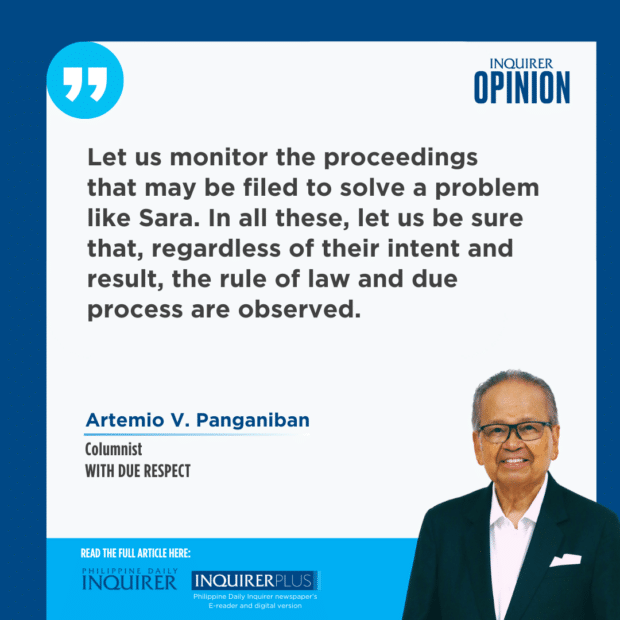How do you solve a problem like Sara?

To begin, let me quote the contentious statement of Vice President Sara Duterte, “Don’t worry about my security because I have already contracted an individual, and told him/her that if I am killed, you should also kill BBM (President Marcos), (First Lady) Liza Araneta-Marcos and (Speaker) Martin Romualdez. No joke. No joke … I have given instructions that if I die, do not stop until you kill (the three personalities) and then he said ‘Yes.’” Later, VP Sara backtracked saying, her remarks were “maliciously taken out of logical context.”
MALACAÑANG ACTED IMMEDIATELY to counter what it called “an active threat.” The President formally explained, “As the head of the executive department, as well as all public servants, I have a sworn duty to uphold the Constitution and the laws. As a democratic country, we need to uphold the rule of law.”
The Executive Secretary, the Department of Justice, National Bureau of Investigation, Philippine National Police, Armed Forces of the Philippines, National Security Council, the House Speaker and several representatives, the Senate President and some senators, and many private citizens urged the filing of (1) criminal charges of grave threats, sedition, direct assault and violation of the anti-terror law, as well as (2) complaints for her disbarment and (3) impeachment.
The filing of criminal charges, their preliminary investigation, and elevation to the courts require relevant and competent evidence. The judgments and appeals will take years. How many times have we witnessed sensational cases discovered during legislative investigations covered by tri-media and cheered by convictions in the lower courts only to be reversed on appeal due to failure to prosecute, or insufficient evidence, or egregious legal errors?
Let us remember that under the present legal standards, “probable cause” is enough for the prosecutors to file charges in the courts and ask for the arrest and detention of the accused, but “proof beyond reasonable doubt” is required for their conviction. In past columns, I disagreed with these disparate standards. Indeed, why prosecute when there is not enough evidence to convict? At bottom, criminal cases take a long time to mature and become final.
DISBARMENT COMPLAINTS ARE GOVERNED by the new Code of Professional Responsibility and Accountability issued by the Supreme Court on April 11, 2023, which became effective 15 days after its publication. Thus, it covers the acts, rants, and expletives of the VP during the last few days. However, disbarment proceedings are “confidential” until their judgment by the Court. Thus, I will desist from further comment.
IN CONTRAST, IMPEACHMENT IS A VERY PUBLIC POLITICAL AND LEGAL EXERCISE. Under the Constitution, the House of Representatives “shall have the exclusive power to initiate all cases of impeachment” of “[t]he President, Vice President, the members of the Supreme Court, the members of the constitutional commissions, and the Ombudsman” on any of these grounds, “culpable violation of the Constitution, treason, bribery, graft and corruption and other high crimes, or betrayal of public trust.”
However, before the House can initiate an impeachment, a verified complaint should first be “filed by any member of the House … or by any citizen upon the resolution of endorsement by any member thereof.” Then, the complaint shall be speedily referred to the “proper committee.” To affirm the Articles of Impeachment prepared by the committee or to override it, the vote of “at least one third of all the members of the House shall be necessary.”
In fact, the verified complaint filed by “at least one-third of all the members of the House … shall constitute the Articles of Impeachment, and trial by the Senate shall forthwith proceed.”
The Senate has the “sole power to try and decide all cases of impeachment.” But “no person shall be convicted without the concurrence of two-thirds of all the members of the Senate.” The judgment may include “disqualification to hold public office.”
If the ground is “betrayal of public trust,” the proceedings will be speedy as there is yet no judicial interpretation of the term. Hence, in my humble opinion, its meaning can best be determined by Congress. In fact, under the doctrine of separation of powers, the judiciary is duty bound to respect legislative actions.
The only exception is if either or both Houses commit “grave abuse of discretion.” I know of only one case (Francisco v. House, Nov. 10, 2003, en banc, per J. Conchita Carpio Morales) in which the Court used this exception by nullifying the impeachment proceeding against Chief Justice Hilario G. Davide Jr. for the House’s violation of the constitutional ban on impeachment “against the same official more than once within a period of one year.”
The President has publicly opposed impeachment. However, if the foregoing steps occur, I think Congress must perform its constitutional duty to process the impeachment till it ends in acquittal or conviction or stoppage by the Court.
Let us monitor the proceedings that may be filed to solve a problem like Sara. In all these, let us be sure that, regardless of their intent and result, the rule of law and due process are observed.
—————-
Comments to chiefjusticepanganiban@hotmail.com




















